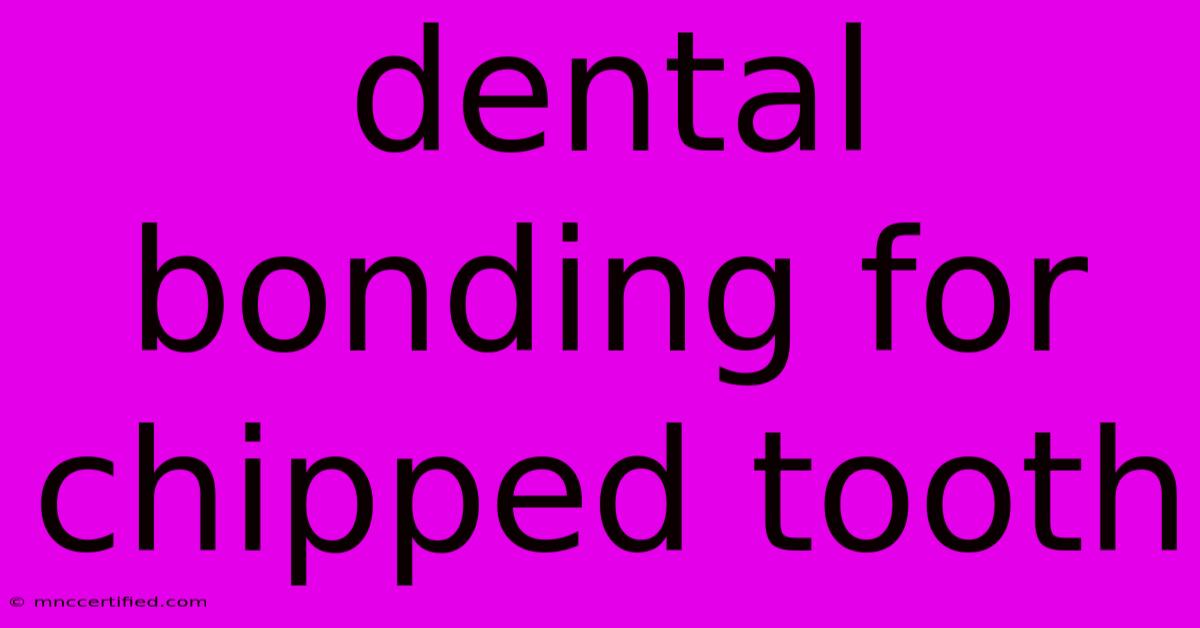Dental Bonding For Chipped Tooth

Table of Contents
Dental Bonding for a Chipped Tooth: A Comprehensive Guide
A chipped tooth can be a frustrating and unsightly problem, impacting both your confidence and your smile. Luckily, dental bonding offers a quick, affordable, and effective solution. This comprehensive guide will explore everything you need to know about dental bonding for a chipped tooth, from the procedure itself to aftercare and potential alternatives.
What is Dental Bonding?
Dental bonding is a cosmetic dental procedure used to repair minor imperfections in teeth, including chips, cracks, gaps, and discoloration. It involves applying a tooth-colored resin material to the affected area and then shaping and hardening it with a special curing light. The resin bonds directly to the tooth's surface, creating a seamless and natural-looking repair. This makes it an ideal solution for chipped teeth, offering a minimally invasive and aesthetically pleasing outcome.
Key Advantages of Dental Bonding for Chipped Teeth:
- Speed and Convenience: The procedure is typically completed in a single appointment, often within an hour or less.
- Affordability: Compared to other restorative procedures like veneers or crowns, dental bonding is generally more cost-effective.
- Minimal Invasiveness: Bonding requires minimal tooth preparation, preserving more of your natural tooth structure.
- Natural Appearance: The resin material is carefully matched to the color of your existing teeth, resulting in a seamless and natural-looking repair.
- Versatility: Dental bonding can be used to repair various types of chips and cracks, addressing both cosmetic and functional concerns.
The Dental Bonding Procedure: A Step-by-Step Guide
The process of dental bonding for a chipped tooth typically involves these steps:
- Examination and Preparation: Your dentist will examine the chipped tooth to assess the extent of the damage and determine the suitability of bonding. They may clean and lightly etch the tooth surface to improve the resin's adhesion.
- Resin Application: A tooth-colored resin material is carefully applied to the chipped area. The dentist will shape and mold the resin to restore the tooth's original form and contours.
- Curing: A special curing light is used to harden the resin, bonding it securely to the tooth.
- Shaping and Polishing: Once hardened, the dentist will further shape and polish the resin to ensure a smooth, natural-looking finish.
- Final Check: Your dentist will perform a final check to ensure the repair is satisfactory and comfortable.
Aftercare and Longevity of Dental Bonding
Proper aftercare is crucial to prolong the life of your dental bonding. Follow these tips:
- Avoid hard and sticky foods: These can potentially chip or damage the bonding.
- Maintain good oral hygiene: Brush and floss regularly to prevent plaque buildup and gum disease.
- Avoid teeth grinding: Grinding your teeth can put stress on the bonding and lead to premature wear. Consider using a mouthguard if you grind your teeth.
- Regular dental checkups: Schedule regular checkups with your dentist to monitor the bonding and address any potential issues.
While dental bonding is durable, it's not permanent. With proper care, it can last for several years, but it may eventually require replacement or repair due to wear and tear.
Alternatives to Dental Bonding for Chipped Teeth
Depending on the severity of the chip, other treatment options may be considered:
- Dental Veneers: Veneers are thin, custom-made shells that cover the front surface of the tooth, offering a more permanent solution for significant chips or cosmetic imperfections.
- Dental Crowns: Crowns are caps that cover the entire tooth, providing a strong and durable restoration for severely damaged teeth.
- Composite Resin Fillings: Similar to bonding, but may be used for larger chips or cracks that require filling rather than just surface repair.
Your dentist will help determine the most appropriate treatment based on your individual needs and the extent of the damage.
Finding a Qualified Dentist
Choosing an experienced and qualified dentist is crucial for successful dental bonding. Look for dentists specializing in cosmetic dentistry, review online testimonials, and schedule consultations to discuss your specific needs and concerns. Don't hesitate to ask questions about the procedure, aftercare, and potential risks involved.
Conclusion: A Smile Worth Protecting
A chipped tooth can significantly impact your self-esteem and oral health. Dental bonding provides a safe, effective, and affordable solution to restore your smile's beauty and functionality. By understanding the procedure, aftercare, and available alternatives, you can make an informed decision and achieve the radiant, confident smile you deserve. Remember to prioritize regular dental checkups for optimal oral health.

Thank you for visiting our website wich cover about Dental Bonding For Chipped Tooth. We hope the information provided has been useful to you. Feel free to contact us if you have any questions or need further assistance. See you next time and dont miss to bookmark.
Featured Posts
-
Lautaros Goal Decides Peru Match
Nov 20, 2024
-
Messi Ties Donovans Record
Nov 20, 2024
-
Mill Cities Community Investments
Nov 20, 2024
-
Ouidad Unbreakable Bonds Shampoo
Nov 20, 2024
-
Two Bears Trading Post New Mexico
Nov 20, 2024